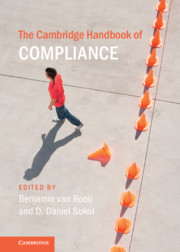Book contents
- The Cambridge Handbook of Compliance
- The Cambridge Handbook of Compliance
- Copyright page
- Contents
- Figures
- Tables
- Contributors
- 1 Introduction: Compliance as the Interaction between Rules and Behavior
- Part I Compliance Concepts and Approaches
- 2 Compliance as Costs and Benefits
- 3 The Professionalization of Compliance
- 4 From Responsive Regulation to Ecological Compliance: Meta-regulation and the Existential Challenge of Corporate Compliance
- 5 Behavioral Ethics as Compliance
- 6 Constructing the Content and Meaning of Law and Compliance
- 7 Compliance as Operations Management
- 8 Compliance and Contestation
- 9 Compliance as Management
- 10 Compliance as Liability Risk Management
- 11 Criminalized Compliance
- 12 Supply Chain Compliance
- 13 Regulatory Compliance in a Global Perspective: Developing Countries, Emerging Markets and the Role of International Development Institutions
- Part II Deterrence and Incapacitation
- Part III Incentives
- Part IV Legitimacy and Social Norms
- Part V Capacity and Opportunity
- Part VI Compliance and Cognition
- Part VII Management and Organizational Processes
- Part VIII Measuring and Evaluating Compliance
- Part IX Analysis of Particular Fields
- References
12 - Supply Chain Compliance
from Part I - Compliance Concepts and Approaches
Published online by Cambridge University Press: 07 May 2021
- The Cambridge Handbook of Compliance
- The Cambridge Handbook of Compliance
- Copyright page
- Contents
- Figures
- Tables
- Contributors
- 1 Introduction: Compliance as the Interaction between Rules and Behavior
- Part I Compliance Concepts and Approaches
- 2 Compliance as Costs and Benefits
- 3 The Professionalization of Compliance
- 4 From Responsive Regulation to Ecological Compliance: Meta-regulation and the Existential Challenge of Corporate Compliance
- 5 Behavioral Ethics as Compliance
- 6 Constructing the Content and Meaning of Law and Compliance
- 7 Compliance as Operations Management
- 8 Compliance and Contestation
- 9 Compliance as Management
- 10 Compliance as Liability Risk Management
- 11 Criminalized Compliance
- 12 Supply Chain Compliance
- 13 Regulatory Compliance in a Global Perspective: Developing Countries, Emerging Markets and the Role of International Development Institutions
- Part II Deterrence and Incapacitation
- Part III Incentives
- Part IV Legitimacy and Social Norms
- Part V Capacity and Opportunity
- Part VI Compliance and Cognition
- Part VII Management and Organizational Processes
- Part VIII Measuring and Evaluating Compliance
- Part IX Analysis of Particular Fields
- References
Summary
Abstract: Responsible supply chain is about ensuring that members of the supply chain act responsibly for the well-being of all people and Mother Earth. It involves both the environmental responsibility side and the social responsibility side. On top of this, responsibility also entails ensuring that products sold to consumers are authentic without having been adulterated, and that the processes throughout the supply chain are run in an ethical manner. Although interests in and concerns over responsibility by the general public, governments, and companies have continued to increase, the problems of controlling violations and noncompliance with responsibility standards remain daunting. This chapter uses a “sense” and “respond” lens to look at how such problems can be addressed. We describe some of the innovative ways that some leading companies have used to make progress.
- Type
- Chapter
- Information
- The Cambridge Handbook of Compliance , pp. 145 - 157Publisher: Cambridge University PressPrint publication year: 2021
References
- 2
- Cited by



